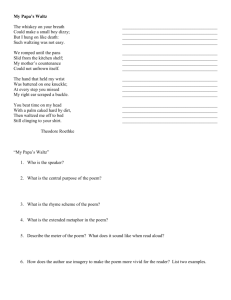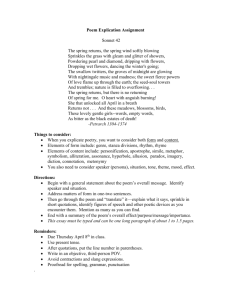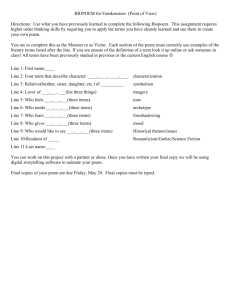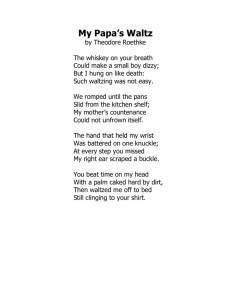My Papa's Waltz
advertisement
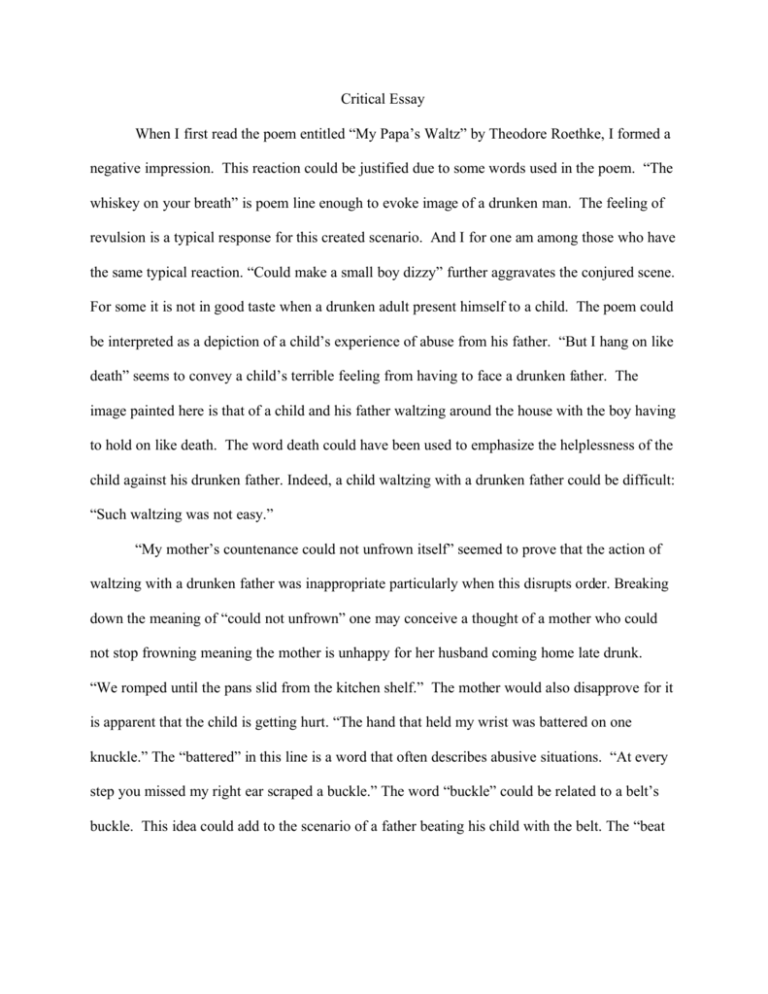
Critical Essay When I first read the poem entitled “My Papa’s Waltz” by Theodore Roethke, I formed a negative impression. This reaction could be justified due to some words used in the poem. “The whiskey on your breath” is poem line enough to evoke image of a drunken man. The feeling of revulsion is a typical response for this created scenario. And I for one am among those who have the same typical reaction. “Could make a small boy dizzy” further aggravates the conjured scene. For some it is not in good taste when a drunken adult present himself to a child. The poem could be interpreted as a depiction of a child’s experience of abuse from his father. “But I hang on like death” seems to convey a child’s terrible feeling from having to face a drunken father. The image painted here is that of a child and his father waltzing around the house with the boy having to hold on like death. The word death could have been used to emphasize the helplessness of the child against his drunken father. Indeed, a child waltzing with a drunken father could be difficult: “Such waltzing was not easy.” “My mother’s countenance could not unfrown itself” seemed to prove that the action of waltzing with a drunken father was inappropriate particularly when this disrupts order. Breaking down the meaning of “could not unfrown” one may conceive a thought of a mother who could not stop frowning meaning the mother is unhappy for her husband coming home late drunk. “We romped until the pans slid from the kitchen shelf.” The mother would also disapprove for it is apparent that the child is getting hurt. “The hand that held my wrist was battered on one knuckle.” The “battered” in this line is a word that often describes abusive situations. “At every step you missed my right ear scraped a buckle.” The word “buckle” could be related to a belt’s buckle. This idea could add to the scenario of a father beating his child with the belt. The “beat time on my head” is another line that might lead the reader to think that the father is abusing the child. This drunkenness of the father and the way the child describes in the poem the event is a manifestation of mistreatment in Theodore Roethke’s poem. As a whole, the words that Roethke chose in describing the scene produce pictures of a violent kind of waltz. In this interpretation, the waltz was not a joyful one. The poem employs a sad mood and a somewhat satirical tone suggestive that the person remembering his childhood is critical of his father. The smell of the whiskey, the roughness, the inconsiderate and the reckless actions of the father were scrutinized and criticized. But there is another analysis of the poem that reveals a different line of ideas. The poem for others conveys a message contrary to the first impression that I formed. They interpret Theodore Roethke’s poem as it is, a dance: “My Papa’s Waltz.” The poem for others evoked good memories in the past. For example, an older man through the poem remembers his father who was a hardworking employee. Particular scenario could be the instances when his father would walk into their home after a day’s work with scraped hands. His father was a strong and tough man yet a good man who provided for the needs of the family. For that person, the poem is a particular memory of a child that stood among the rest. This was a story of a boy reminiscing that instance when his father had returned home from work one late evening. He happened to be in a celebration along with his co-workers at a local pub. He excitedly waltzed while entering his home, and proudly picked up his son, swinging him around in a dizzying waltz. Father and child playfully danced and wrestled in the living room. Hence, making this poem funny for some. A kid dancing with a drunken father would make readers think that the child is having fun with his dad. Topping the funny scenario is the expression of a mother getting peeved of what’s going on in her kitchen: “We romped until the pans slid from the kitchen shelf.” The father and son romping typically arouse this kind of reaction from every mother, with her being the lady of the house. This is a positive bonding experience between a father and child particularly between a father and a son. The poem is said to employ a winning tone that is light and almost comical. The constant rhythm throughout the poem endows it with a light beat like a waltz. It shows that the child was very fond of his father. Though the poem starts in a serious tone it progresses into a playful one reinforcing the caring regard of the child to the father. He really valued his father and the hard work that he did to provide for the family’s needs. “With a palm caked hard by dirt, then waltzed me off to bed still clinging to your shirt.” This is a remarkable line expressing the bond and the love that exists between father and son. Through it all, the poem in its simplicity of delivery has managed to evoke two totally different reactions. The two thoughts are quite distinct from each other. There is no middle ground. One either takes it as a poem with negative implications or a poem with positive implications. I think the judgment would depend mostly on the experiences, the cultural, social, and psychological background among others of an individual. Having this criterion in mind, then I assessed the poem as a positive one. A boy indeed needs this kind of experience from their father for them to see not just the strong, matured, and responsible nature of their father. It is a joyful experience for a child to see his/her father in a light and playful mood particularly when he has a taste of spirit. The poem does not explicitly states that the child is being beaten and physically hurt by the father. There is just this free-spirited form of dancing that could bring no harm to a boy. It is funny and sweet to be able to see a father out of their usual tough and matter of fact persona. It brings them closer to their children.




